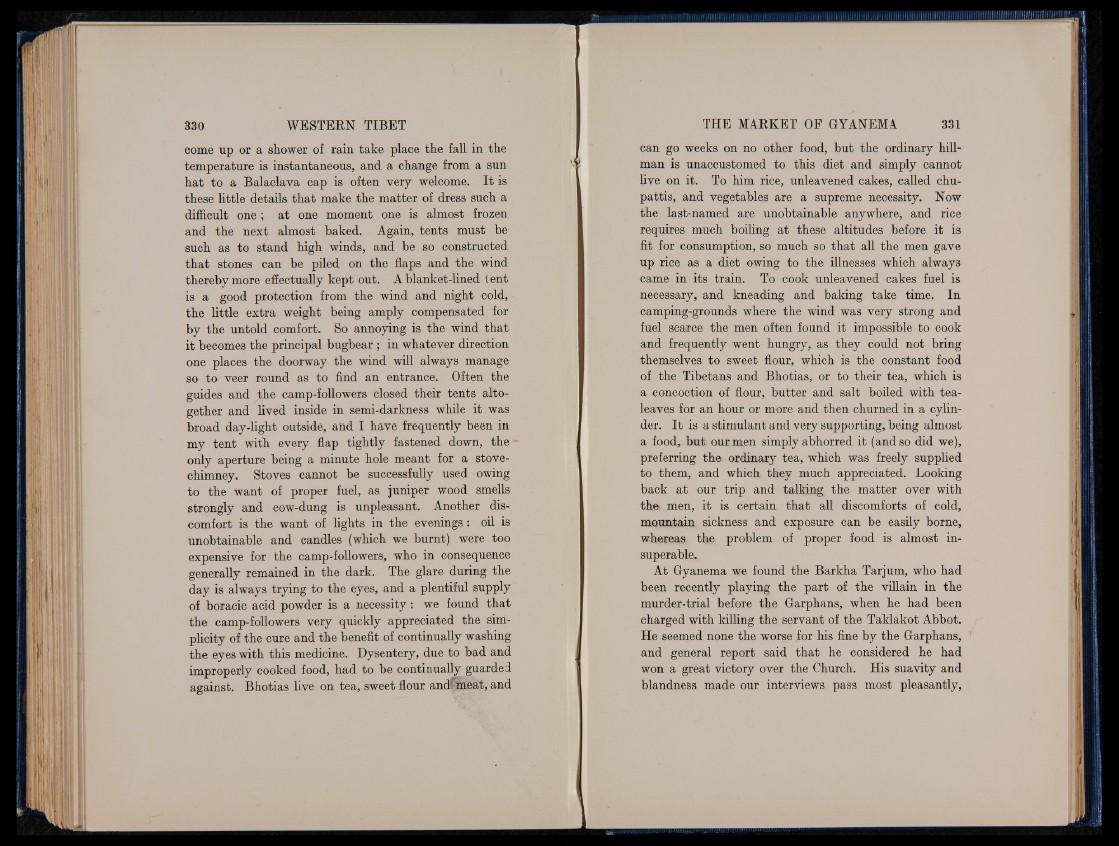
come up or a shower of rain take place the fall in the
temperature is instantaneous, and a change from a sun
hat to a Balaclava cap is often very welcome. I t is
these little details that make the matter of dress such a
difficult one ; at one moment one is almost frozen
and the next almost baked. Again, tents must be
such as to stand high winds, and be so constructed
that stones can be piled on the flaps and the wind
thereby more effectually kept out. A blanket-lined lent
is a good protection from the wind and night cold,
the little extra weight being amply compensated for
by the untold comfort. So annoying is the wind that
it becomes the principal bugbear ; in whatever direction
one places the doorway the wind will always manage
so to veer round as to find an entrance. Often the
guides and the camp-followers closed their tents altogether
and lived inside in semi-darkness while it was
broad day-light outside, and I have frequently been in
my tent with every flap tightly fastened down, the
only aperture being a minute hole meant for a stove-
chimney. Stoves cannot be successfully used owing
to the want of proper fuel, as juniper wood smells
strongly and cow-dung is unpleasant. Another discomfort
is the want of lights in the evenings: oil is
unobtainable and candles (which we burnt) were too
expensive for the camp-followers, who in consequence
generally remained in the dark. The glare during the
day is always trying to the eyes, and a plentiful supply
of boracic acid powder is a necessity: we found that
the camp-followers very quidkly appreciated the simplicity
of the cure and the benefit of continually washing
the eyes with this medicine. Dysentery, due to bad and
improperly cooked food, had to be continually guarded
against. Bhotias live on tea, sweet flour andfSaeat, and
can go weeks on no other food, but the ordinary hill-
man is unaccustomed to this diet and simply cannot
live on it. To him rice, unleavened cakes, called chu-
pattis, and vegetables are a supreme necessity. Now
the last-named are unobtainable anywhere, and rice
requires much boiling at these altitudes before it is
fit for consumption, so much so that all the men gave
up rice as a diet owing to the illnesses which always
came in its train. To cook unleavened cakes fuel is
necessary, and kneading and baking take time. In
camping-grounds where the wind was very strong and
fuel scarce the men often found it impossible to cook
and frequently went hungry, as they could not bring
themselves to sweet flour, which is the constant food
of the Tibetans and Bhotias, or to their tea, which is
a concoction of flour, butter and salt boiled with tea-
leaves for an hour or more and then churned in a cylinder.
I t is a stimulant and very supporting, being almost
a food, but our men simply abhorred it (and so did we),
preferring the ordinary tea, which was freely supplied
to them, and which they much appreciated. Looking
back at our trip and talking the matter over with
the men, it is certain that all discomforts of cold,
mountain sickness and exposure can be easily borne,
whereas the problem of proper food is almost insuperable.
At Gyanema we found the Barkha Tarjum, who had
been recently playing the part of the villain in the
murder-trial before the Garphans, when he had been
charged with killing the servant of the Taklakot Abbot.
He seemed none the worse for his fine by the Garphans,
and general report said that he considered he had
won a great victory over the Church. His suavity and
blandness made our interviews pass most pleasantly,